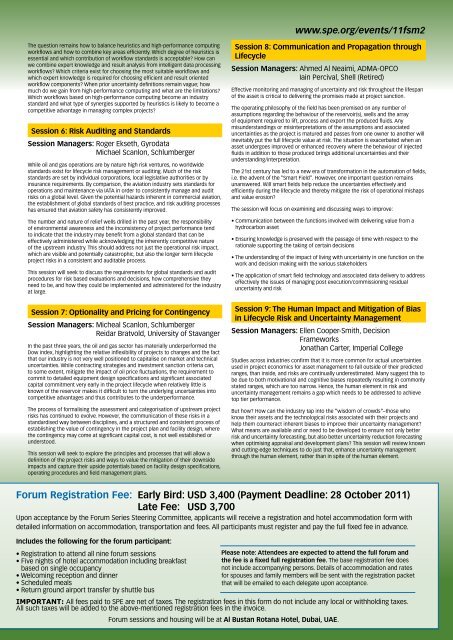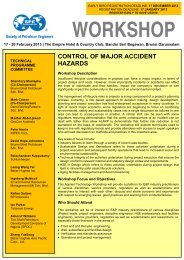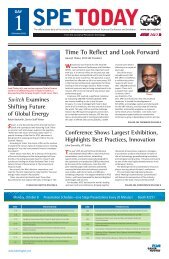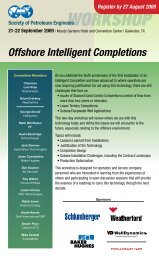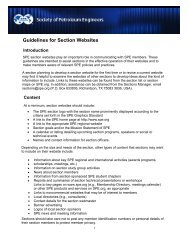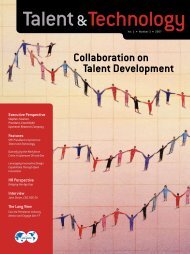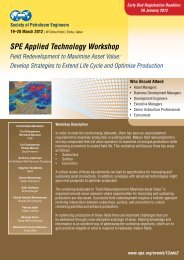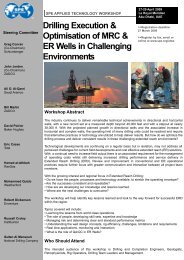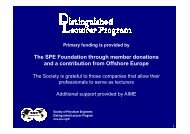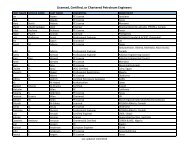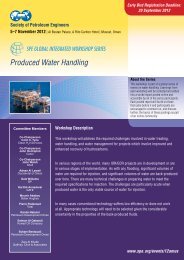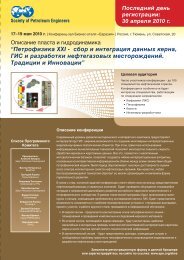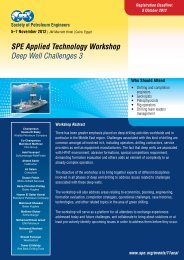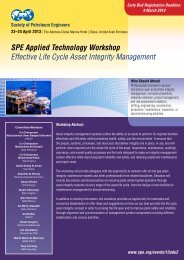Uncertainty Management and Risk Mitigation Over Asset Lifecycles
Uncertainty Management and Risk Mitigation Over Asset Lifecycles
Uncertainty Management and Risk Mitigation Over Asset Lifecycles
Create successful ePaper yourself
Turn your PDF publications into a flip-book with our unique Google optimized e-Paper software.
The question remains how to balance heuristics <strong>and</strong> high-performance computing<br />
workflows <strong>and</strong> how to combine key areas efficiently. Which degree of heuristics is<br />
essential <strong>and</strong> which contribution of workflow st<strong>and</strong>ards is acceptable? How can<br />
we combine expert knowledge <strong>and</strong> result analysis from intelligent data processing<br />
workflows? Which criteria exist for choosing the most suitable workflows <strong>and</strong><br />
which expert knowledge is required for choosing efficient <strong>and</strong> result oriented<br />
workflow components? When prior uncertainty definitions remain vague; how<br />
much do we gain from high-performance computing <strong>and</strong> what are the limitations?<br />
Which workflows based on high-performance computing become an industry<br />
st<strong>and</strong>ard <strong>and</strong> what type of synergies supported by heuristics is likely to become a<br />
competitive advantage in managing complex projects?<br />
Session 6: <strong>Risk</strong> Auditing <strong>and</strong> St<strong>and</strong>ards<br />
Session Managers: Roger Ekseth, Gyrodata<br />
Michael Scanlon, Schlumberger<br />
While oil <strong>and</strong> gas operations are by nature high risk ventures, no worldwide<br />
st<strong>and</strong>ards exist for lifecycle risk management or auditing. Much of the risk<br />
st<strong>and</strong>ards are set by individual corporations, local legislative authorities or by<br />
insurance requirements. By comparison, the aviation industry sets st<strong>and</strong>ards for<br />
operations <strong>and</strong> maintenance via IATA in order to consistently manage <strong>and</strong> audit<br />
risks on a global level. Given the potential hazards inherent in commercial aviation,<br />
the establishment of global st<strong>and</strong>ards of best practice, <strong>and</strong> risk auditing processes<br />
has ensured that aviation safety has consistently improved.<br />
The number <strong>and</strong> nature of relief wells drilled in the past year, the responsibility<br />
of environmental awareness <strong>and</strong> the inconsistency of project performance tend<br />
to indicate that the industry may benefit from a global st<strong>and</strong>ard that can be<br />
effectively administered while acknowledging the inherently competitive nature<br />
of the upstream industry. This should address not just the operational risk impact,<br />
which are visible <strong>and</strong> potentially catastrophic, but also the longer term lifecycle<br />
project risks in a consistent <strong>and</strong> auditable process.<br />
This session will seek to discuss the requirements for global st<strong>and</strong>ards <strong>and</strong> audit<br />
procedures for risk based evaluations <strong>and</strong> decisions, how comprehensive they<br />
need to be, <strong>and</strong> how they could be implemented <strong>and</strong> administered for the industry<br />
at large.<br />
Session 7: Optionality <strong>and</strong> Pricing for Contingency<br />
Session Managers: Micheal Scanlon, Schlumberger<br />
Reidar Bratvold, University of Stavanger<br />
In the past three years, the oil <strong>and</strong> gas sector has materially underperformed the<br />
Dow index, highlighting the relative inflexibility of projects to changes <strong>and</strong> the fact<br />
that our industry is not very well positioned to capitalise on market <strong>and</strong> technical<br />
uncertainties. While contracting strategies <strong>and</strong> investment sanction criteria can,<br />
to some extent, mitigate the impact of oil price fluctuations, the requirement to<br />
commit to detailed equipment design specifications <strong>and</strong> significant associated<br />
capital commitment very early in the project lifecycle when relatively little is<br />
known of the reservoir makes it difficult to turn the underlying uncertainties into<br />
competitive advantages <strong>and</strong> thus contributes to the underperformance.<br />
The process of formalising the assessment <strong>and</strong> categorisation of upstream project<br />
risks has continued to evolve. However, the communication of these risks in a<br />
st<strong>and</strong>ardised way between disciplines, <strong>and</strong> a structured <strong>and</strong> consistent process of<br />
establishing the value of contingency in the project plan <strong>and</strong> facility design, where<br />
the contingency may come at significant capital cost, is not well established or<br />
understood.<br />
This session will seek to explore the principles <strong>and</strong> processes that will allow a<br />
definition of the project risks <strong>and</strong> ways to value the mitigation of their downside<br />
impacts <strong>and</strong> capture their upside potentials based on facility design specifications,<br />
operating procedures <strong>and</strong> field management plans.<br />
Forum Registration Fee: Early Bird: USD 3,400 (Payment Deadline: 28 October 2011)<br />
Late Fee: USD 3,700<br />
Upon acceptance by the Forum Series Steering Committee, applicants will receive a registration <strong>and</strong> hotel accommodation form with<br />
detailed information on accommodation, transportation <strong>and</strong> fees. All participants must register <strong>and</strong> pay the full fixed fee in advance.<br />
Includes the following for the forum participant:<br />
• Registration to attend all nine forum sessions<br />
• Five nights of hotel accommodation including breakfast<br />
based on single occupancy<br />
• Welcoming reception <strong>and</strong> dinner<br />
• Scheduled meals<br />
• Return ground airport transfer by shuttle bus<br />
www.spe.org/events/11fsm2<br />
Session 8: Communication <strong>and</strong> Propagation through<br />
Lifecycle<br />
Session Managers: Ahmed Al Neaimi, ADMA-OPCO<br />
Iain Percival, Shell (Retired)<br />
Effective monitoring <strong>and</strong> managing of uncertainty <strong>and</strong> risk throughout the lifespan<br />
of the asset is critical to delivering the promises made at project sanction.<br />
The operating philosophy of the field has been premised on any number of<br />
assumptions regarding the behaviour of the reservoir(s), wells <strong>and</strong> the array<br />
of equipment required to lift, process <strong>and</strong> export the produced fluids. Any<br />
misunderst<strong>and</strong>ings or misinterpretations of the assumptions <strong>and</strong> associated<br />
uncertainties as the project is matured <strong>and</strong> passes from one owner to another will<br />
inevitably put the full lifecycle value at risk. The situation is exacerbated when an<br />
asset undergoes improved or enhanced recovery where the behaviour of injected<br />
fluids in addition to those produced brings additional uncertainties <strong>and</strong> their<br />
underst<strong>and</strong>ing/interpretation.<br />
The 21st century has led to a new era of transformation in the automation of fields,<br />
i.e. the advent of the “Smart Field”. However, one important question remains<br />
unanswered. Will smart fields help reduce the uncertainties effectively <strong>and</strong><br />
efficiently during the lifecycle <strong>and</strong> thereby mitigate the risk of operational mishaps<br />
<strong>and</strong> value erosion?<br />
The session will focus on examining <strong>and</strong> discussing ways to improve:<br />
• Communication between the functions involved with delivering value from a<br />
hydrocarbon asset<br />
• Ensuring knowledge is preserved with the passage of time with respect to the<br />
rationale supporting the taking of certain decisions<br />
• The underst<strong>and</strong>ing of the impact of living with uncertainty in one function on the<br />
work <strong>and</strong> decision making with the various stakeholders<br />
• The application of smart field technology <strong>and</strong> associated data delivery to address<br />
effectively the issues of managing post execution/commissioning residual<br />
uncertainty <strong>and</strong> risk<br />
Session 9: The Human Impact <strong>and</strong> <strong>Mitigation</strong> of Bias<br />
in Lifecycle <strong>Risk</strong> <strong>and</strong> <strong>Uncertainty</strong> <strong>Management</strong><br />
Session Managers: Ellen Cooper-Smith, Decision<br />
Frameworks<br />
Jonathan Carter, Imperial College<br />
Studies across industries confirm that it is more common for actual uncertainties<br />
used in project economics for asset management to fall outside of their predicted<br />
ranges, than inside, <strong>and</strong> risks are continually underestimated. Many suggest this to<br />
be due to both motivational <strong>and</strong> cognitive biases repeatedly resulting in commonly<br />
stated ranges, which are too narrow. Hence, the human element in risk <strong>and</strong><br />
uncertainty management remains a gap which needs to be addressed to achieve<br />
top tier performance.<br />
But how? How can the industry tap into the “wisdom of crowds”–those who<br />
know their assets <strong>and</strong> the technological risks associated with their projects <strong>and</strong><br />
help them counteract inherent biases to improve their uncertainty management?<br />
What means are available <strong>and</strong> or need to be developed to ensure not only better<br />
risk <strong>and</strong> uncertainty forecasting, but also better uncertainty reduction forecasting<br />
when optimising appraisal <strong>and</strong> development plans? This session will review known<br />
<strong>and</strong> cutting-edge techniques to do just that, enhance uncertainty management<br />
through the human element, rather than in spite of the human element.<br />
Please note: Attendees are expected to attend the full forum <strong>and</strong><br />
the fee is a fixed full registration fee. The base registration fee does<br />
not include accompanying persons. Details of accommodation <strong>and</strong> rates<br />
for spouses <strong>and</strong> family members will be sent with the registration packet<br />
that will be emailed to each delegate upon acceptance.<br />
IMPORTANT: All fees paid to SPE are net of taxes. The registration fees in this form do not include any local or withholding taxes.<br />
All such taxes will be added to the above-mentioned registration fees in the invoice.<br />
Forum sessions <strong>and</strong> housing will be at Al Bustan Rotana Hotel, Dubai, UAE.


